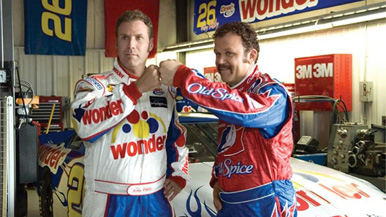The Number One Movie in America
Talladega Nights: The Ballad of Ricky Bobby
By Sean Collier
April 1, 2019
BoxOfficeProphets.com

If you don’t know what they are, neither ask nor Google it.
The episode reveals, however, a curious fact about the owners of this novelty item. They’re in on the joke. There is a natural assumption that anyone who would affix this particular product to their trailer hitch must do so as an aggressive, confrontational sort of posturing. Turns out that most people who’ve purchased TruckNutz are making fun of themselves: “I’m the kind of person who you think would have this. Isn’t that ridiculous?”
The hidden truth is that Americans of a certain ilk — the easiest shorthand might be “redneck,” but I prefer “faux-country” — are all too happy to laugh at themselves, as long as the satire is more absurd than aggressive. If that’s the case, than the strong box office of “Talladega Nights: The Ballad of Ricky Bobby” makes perfect sense; it’s a pointed parody of southern sprawl and NASCAR culture, but one which seems to honor its target as much as lampoon it.
Will Ferrell’s big-screen reputation was still growing, shakily, in 2006. Sure, “Elf” was a massive hit, but his more adult comedies produced modest box-office results; neither “Old School” nor “Anchorman” hit the $100 million mark, both benefiting greatly from the growing ubiquity of DVD players in early-’00s dorm rooms. Even after “Anchorman,” Ferrell spent 2005 on a string of misses; “Kicking and Screaming” barely cracked $50 million, “Bewitched” didn’t do much better and “The Producers” was a commercial disaster.
A year later, though, the right combination of a hungry cast, subject and star made “Talladega Nights: The Ballad of Ricky Bobby” a massive hit. John C. Reilly, whose previous bout of recognition had been a string of more dramatic turns in 2002 (“The Hours,” “Gangs of New York” and the sad-sack husband in “Chicago”), was itching to show off his comedy chops. Sacha Baron Cohen was months away from lighting the world on fire with “Borat.” Amy Adams and Jane Lynch were not yet heavyweights; Michael Clarke Duncan needed a reinvention. And a deep well of comedy power hitters, including Rob Riggle and Jack McBrayer, fought for recognition in every scene.
The absurdities of NASCAR were also ripe for parody, from the ubiquity of advertising (it doesn’t seem at all absurd when Ricky sells the rights to his windshield to Fig Newtons) to the awkwardness of post-race interviews. And while he can certainly play an elf or a self-obsessed newscaster, Ferrell is at his best as an absurd amplification of the everyman — a person who certainly could exist somewhere below the Mason-Dixon line.
“Talladega Nights” easily took its August opening weekend, netting more than $47 million, and remained a success throughout the dog days of summer. It repeated in the top spot the following week, fending off challenges from the original “Step Up” and Oliver Stone’s “World Trade Center,” and very nearly won a third weekend, missing the top spot by less than $100,000. (That weekend’s winner was “Snakes on a Plane.” It was a big moment for over-the-top comedy.)
The film would gross more than $148 million domestically (with, unsurprisingly, a very modest global take), remaining in the Top 20 for nine weeks. Excluding cameo roles, it’s the third highest-grossing live-action role for Ferrell, behind only “Elf” and “Daddy’s Home.” It’s easily the most successful directorial effort for Oscar winner Adam McKay.
“Talladega Nights” holds up well, thanks to a clearly improv-first on-set culture; there are dozens of alternate riffs and line readings on the film’s DVD, as Ferrell, Reilly and Cohen were clearly given free reign to dive into any bit they could conceive while the cameras rolled. It also benefits from an across-the-board commitment to the stakes; no one here is scoffing at the way the characters act or indulging in meta-narrative commentary on what’s going on. (It’s that fact that, to me, makes “Talladega Nights” better than its follow-up, “Step Brothers,” which is bogged down by characters constantly pointing out the absurdity of the premise.)
There are the requisite handful of jokes that don’t age well, sure, and “Talladega Nights” is probably a bit too long. (It also really should’ve done something with Amy Adams before the last act.) But it’s loaded with great jokes that don’t even rank in the film’s ten most memorable bits, waiting to be rediscovered on repeat viewings. (“So then why is the song on the jukebox?” “We keep it on there for profiling purposes. We also got the Pet Shop Boys and Seal.”)
As the era when Will Ferrell could open a big-budget comedy on name alone recedes further into the past — let’s not speak of “The House” — it may well be that “Talladega Nights” stands as a undeniably effective comedy more than anything in his catalog. It’s funny, it’s charming and it’s well crafted. I’ve long had a soft spot for it, and I think “Talladega Nights” comes by its strong reputation quite honestly.
“Talladega Nights” is the subject of the latest episode of The Number One Movie in America, a look back at past box-office champions. Each episode’s film is drawn at random from a list of every number-one movie since 1982. Please listen and subscribe!
Next time: Brandy, you're a fine girl.